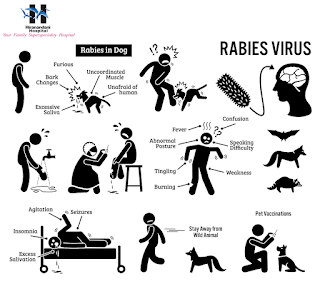Dr. L.H. Hiranandani Hospital: What are the common signs and symptoms of Rabies?
Rabies is a potentially fatal virus-borne illness. Although rabies is mostly a disease of animals, people can get it when infected animals bite them. The virus transmits to humans by the saliva of an infected animal.
According to Hiranandani Hospital Powai News, when a person begins to display signs and symptoms of rabies, the disease almost often kills them. As a result, everybody who is at danger of developing rabies should receive rabies vaccines to protect themselves.
What are the signs and symptoms of rabies?
After being bitten by an infected animal, symptoms might occur as quickly as a few days later. However, symptoms may not show for weeks or months in most situations.
A tingling or twitching feeling in the area around the animal bite is one of the most unusual signs of rabies infection. After the virus exits the bite site, it travels up a neighboring nerve to the brain, where it can produce symptoms such as fever, headaches, anxiety, confusion, difficulty in swallowing, insomnia, agitation, nausea, seizures, paralysis and hallucinations.
Risk factors
The following factors can enhance your chance of contracting rabies:
- Traveling to or living in an underdeveloped country where rabies is more prevalent.
- Activities that are likely to expose you to rabies-infected wild animals, such as visiting caverns where bats reside or camping without taking steps to keep wild animals away from your campground.
- Working as a veterinary technician.
- Wounds to the head or neck, which may allow the rabies virus to travel more quickly to your brain.
How to prevent rabies?
To limit your chances of coming into touch with rabid animals, take the following precautions:
- Vaccinate your animals
Rabies vaccines are available for cats, dogs, and ferrets. Inquire with your veterinarian about how frequently your dogs should be vaccinated.
- Keep your pets in their kennels
Keep your dogs indoors and keep an eye on them when they go outside. This will help keep your pets away from wild creatures.
- Keep little pets safe from predators
Keep rabbits and other tiny pets, such as guinea pigs, inside or in secure cages to keep wild animals at bay.
- Avoid approaching wild animals
Wild animals infected with rabies may appear fearless of humans. It is unusual for a wild animal to be friendly with humans, therefore avoid any animal that appears unconcerned.
- Keep bats away from your home
Seal any crevices or openings through which bats might enter your property. If you know you have bats in your home, consult with a local expert to figure out how to keep them out.
- Consider vaccination
Get a rabies vaccine if you frequently travel or are in close proximity to animals that have rabies. If you're going to a place where rabies is frequent and will be there for a lengthy amount of time, see your doctor about getting the rabies vaccination.
Conclusion
Rabies is a deadly virus carried by infected animals through their saliva. It begins with flu-like symptoms and progresses to fever, muscular spasms, unconsciousness, and, finally, death.
Although there is no cure once symptoms show, rabies immunizations are typically helpful at avoiding infections. People, on the other hand, must seek medical attention as soon as they notice any symptoms.
Anyone who has been bitten by a possibly infected animal should seek medical assistance immediately and undergo post-exposure immunizations. If they have not already received the virus vaccination, they may additionally require fast-acting RIG, advises Dr Sujit Chatterjee Hiranandani Hospital.



Comments
Post a Comment